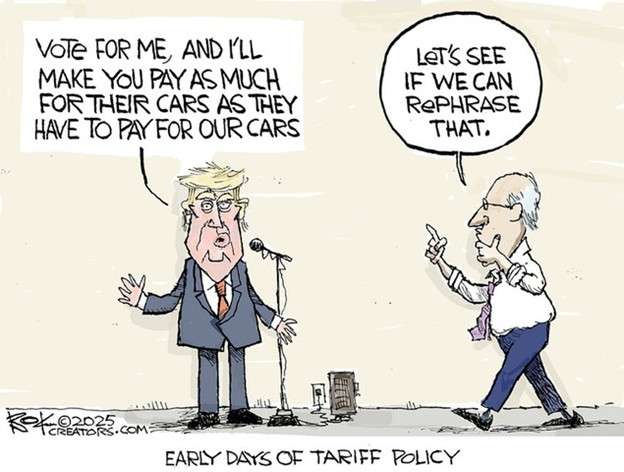
05 Apr DEI
“Is American exceptionalism grounded in meritocratic capitalism or pluralistic diversity, equity and inclusion…, or both?” – The Lonely Realist
Meritocratic success has defined America for more than 200 years…, as has the American Dream of building a diverse, pluralistic “nation of immigrants.” American Exceptionalism is based on a capitalist system in which those who are talented and work hard can move ahead on the basis of their achievements. Capitalism rewards those who accomplish the most. They “earn” their success. While it is also true that capitalism breeds inequality – those with “economic, social or cultural capital” have inherent advantages –, America distinguishes itself from other countries by providing Americans with geographic, social and economic mobility so that those with talent, passion, perseverance and dedication have the greatest opportunity to succeed. More than anywhere else on Earth, Americans are able to reap the consequent rewards.
That definitional paradigm has been challenged in recent years by those who point to historic inequalities that hold back certain Americans. For example, “The idea that America is a meritocracy … is a seductive lie, perpetuated to obscure the nation’s true foundation of racial exploitation and systemic inequality.” While this perspective focuses primarily on the insidious long-term effects of slavery and racial discrimination, inequality in America (and elsewhere) persists for a variety of reasons, whether due to economic advantage, social status, cultural preference, race, gender, religion, etc. Economic inequality on a country-by-country basis is often measured by the Gini Coefficient which for the U.S. (at 41.3) is relatively high for a first world country and therefore serves as prima facie evidence of American inequality (noting that the Gini Coefficient measures “income inequality” omitting non-cash social benefits). The desire to reduce or eliminate economic (and other forms of) inequality – that is, “to level the playing field for those who have been historically excluded from opportunities simply because of the color of their skin, their gender, or their socioeconomic status” – led to programs that mandated “diversity, equity and inclusion” (DEI) intended to rebalance the scales of rentier capitalism. DEI programs favor those categories of Americans perceived to be victims of imbedded discrimination – in the justice system, hiring and firing, education, etc. DEI programs were developed to address the concerns raised by Black Lives Matter, I Can’t Breathe, #MeToo and others, sparking a reevaluation of meritocratic mobility that focuses on rebalancing “preferential equity” as a means to right perceived historic wrongs. Workplace DEI programs consequently proliferated and became politicized, often dividing Americans along demographic and party lines.
The core problem with DEI is that it rewards individuals not on their merit, but on the basis of their perceived disadvantaged status. It is grounded in the belief that DEI programs have a positive, constructive impact by creating more diverse environments, furthering societal equity, and correcting prior exclusionary practices. However, in doing so, DEI programs necessarily reward selected individuals who “Didn’t Earn It,” discriminating against individuals who “Did Earn It” but who are not treated as members of a disadvantaged class. DEI accordingly functions as an exception to merit, utilizing reverse discrimination to re-engineer towards what is hoped to be a more equitable society. Yet, “earning it” is the essence of societal success…, and the reason why American Exceptionalism has been such a resounding achievement. Although African Americans, women and the economically disadvantaged have been subjected to significant disadvantages, the attempt to use DEI programs today to compensate for historical disadvantages creates new forms of inequality that undercut the benefits of a meritocracy. Yet, it’s impossible to deny that DEI programs reduce racial bias in hiring, provide compensating benefits to women and same sex couples, and destigmatize mental illness in the workplace. It therefore is unsurprising that a Pew Research Study shows that, for 56% of employed U.S. adults, increasing DEI at work is a good thing.
The success of a meritocracy is maximized by maximizing opportunity, including through equal access to education, jobs, housing, infrastructure and public goods. America in the 1960s sought to correct equal access imbalances through affirmative action in an effort to remedy historic discrimination by creating greater diversity in American education, employment and housing. Those programs were the precursors of DEI. Studies show that affirmative action indeed improved outcomes for ethnic, religious and racial minorities. However, those positive results came at a cost and, in 2023, the Supreme Court ruled that race-conscious college admissions violate the Equal Protection Clause of the Constitution. Although DEI doesn’t cross the line into unConstitutionality, the Supreme Court’s analysis of equal opportunity applies to DEI programs just as clearly as it does to affirmative action. After all, even though the goal of DEI is the same as affirmative action – to compensate for historic wrongs –, explicitly favoring one group over others is unequal and discriminatory. In America’s capitalist economy, each institution and each business has the right to decide for itself whether adoption of DEI principles, in whole or in part, benefits its bottom line. If not, no law requires that it do so…, and no law precludes it from doing so. The politicized question is whether the Federal government should be involved in that analysis. It should not. And yet, the Federal government recently made it clear that it not only will not mandate DEI, but that it will reject DEI, DEI programs and any business or institution that advocates DEI (raising the separate Free Speech question). That goes too far. Rewarding merit and factoring in diversity, equity and inclusion are all foundationally American. Making those determinations accordingly should be left to American businesses, employers, schools and colleges without government interference, approval or opprobrium.
Finally (from a good friend)





No Comments